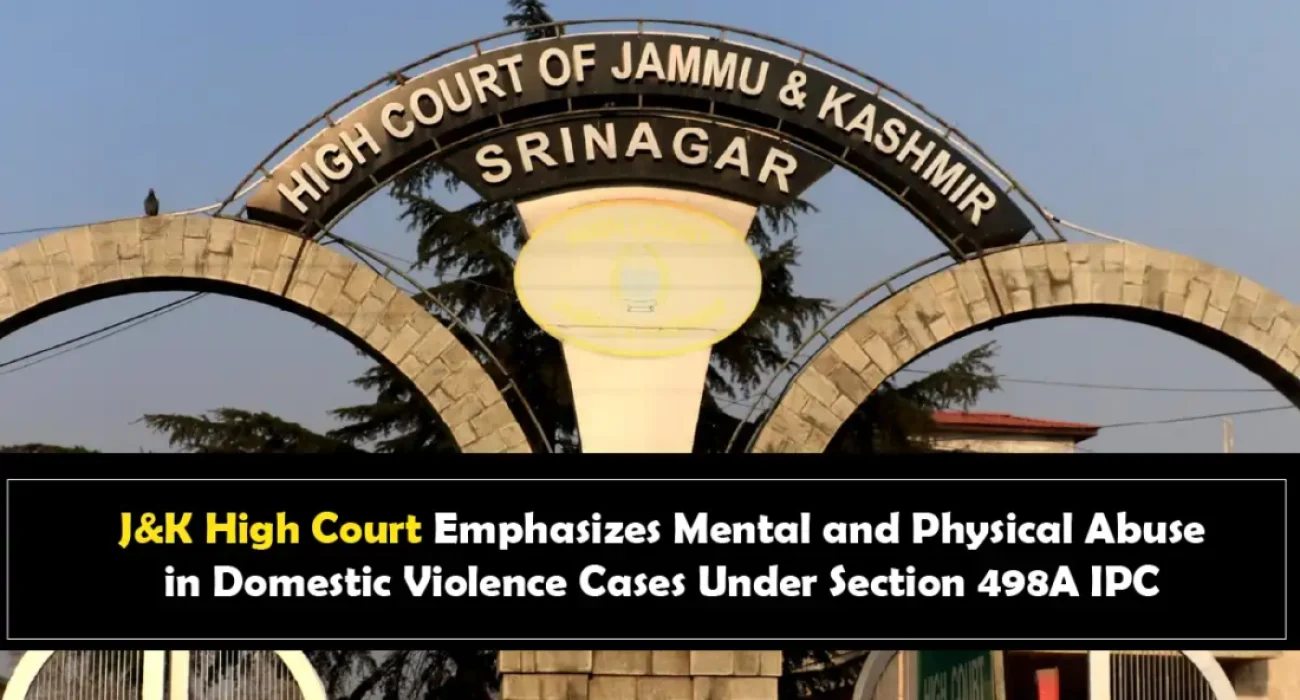

Table of Contents
ToggleThe High Court of Jammu & Kashmir and Ladakh recently ruled on two petitions seeking the quashing of an FIR lodged under Sections 498A and 109 of the Indian Penal Code (IPC). These petitions were filed by the husband and in-laws of the complainant, Amandeep Kour, who alleged both physical and mental harassment following her marriage. The accused contended that the allegations were vague and failed to meet the essential criteria for cruelty under Section 498A IPC.
The court’s ruling emphasizes the broad scope of Section 498A, explaining that the term “cruelty” under this section does not require that the woman be driven to suicide or self-harm; instead, grave mental or physical injury alone suffices to attract the offense. The judgment further reinforced that cruelty, whether or not it causes suicide or self-harm, would be actionable under Section 498A IPC if the intention was to cause grave injury to the woman.
The petitioners, who are the husband and in-laws of the complainant, challenged the FIR on several grounds:
The complainant, Amandeep Kour, contended that the petitioners’ actions amounted to grave physical and mental harassment, fulfilling the criteria for cruelty under Section 498A IPC:
The court underscored the broad interpretation of cruelty under Section 498A IPC, noting that mental and physical abuse, regardless of whether it drives the woman to suicide or self-harm, qualifies as cruelty. The court specifically referred to the Explanation (a) of Section 498A, stating:
“…as per clause (a) of the Explanation not only the conduct that may drive a woman to commit suicide or to cause grave injury to herself would amount to cruelty but even a conduct which causes grave injury to the woman or causes a danger to life, limb or health, whether mental or physical of the woman, would amount to cruelty within the meaning of Section 498-A IPC.”
This statement clarifies that grave injury to the woman’s health or safety, either mental or physical, falls within the scope of cruelty under this provision.
The court detailed the complainant’s allegations, which included severe physical and mental abuse by her husband and in-laws shortly after her marriage in April 2021. The complainant’s statement described how her husband left for Canada a few days after their marriage, abandoning her in the care of his parents. She claimed that her in-laws subjected her to physical assault and threatened her life. Additionally, she was allegedly taunted about her financial status, and faced continuous verbal abuse. The court referenced these allegations as follows:
“…She has also stated that her husband left for Canada only a few days after the marriage without taking her along with him and without even taking any steps for her travel to Canada to accompany her and instead left her as servant for his parents. These acts clearly amount to grave injury or danger to health (mental and physical) of the complainant.”
The court noted that these actions amounted to grave injury, fulfilling the conditions for cruelty under Section 498A.
The petitioners, in challenging the FIR, argued that the allegations were too vague and general, lacking specific incidents of cruelty. They relied on previous Supreme Court judgments, such as Shakson Belthissor v. State of Kerala (2009), which emphasized the need for more detailed allegations to constitute cruelty. However, the J&K High Court rejected this argument, highlighting that the FIR need not contain every detail of the crime. The court explained:
“An FIR is not an encyclopedia of the crime. Details surface during investigation.”
The court found that the complainant had provided a detailed seven-page statement under Section 161 CrPC, corroborated by witness statements, which included dates, specific instances of abuse, and threats. Therefore, the court ruled that the FIR provided enough information to justify an investigation.
The court further noted the involvement of the complainant’s in-laws in the alleged harassment and mental torture. In particular, it referred to the incidents of threats of physical violence, emotional abuse, and physical assaults that the complainant suffered, especially after her husband left for Canada. The court opined:
“The statement of the complainant gets support from the statements of the parents of the complainant recorded under section 161 Cr.P.C as also the statements of other independent witnesses recorded during the investigation of the case.”
The corroborative evidence from the complainant’s parents and other independent witnesses further substantiated her claims, strengthening the case against the accused.
After considering the allegations and the legal provisions, the J&K High Court concluded that the accusations in the FIR were sufficient to establish a case of cruelty under Section 498A IPC. The court found that the actions of the husband and in-laws caused grave mental and physical injury, which fulfilled the statutory definition of cruelty under the section. The court concluded:
“Once it is shown that the intention of the husband or his relatives, while resorting to a particular conduct against the woman, would lead to grave injury or danger to life, limb or health (mental or physical) of the woman, it amounts to cruelty within the meaning of section 498A IPC.”
Thus, the court dismissed the petitions filed by the husband and in-laws, ruling that the material on record clearly disclosed the commission of cognizable offenses under Section 498A IPC.
The J&K High Court’s ruling reaffirms the broad interpretation of cruelty under Section 498A IPC, which does not require evidence of suicide or self-harm but focuses on whether the accused’s actions have caused grave mental or physical injury. This judgment clarifies that any conduct that endangers a woman’s health, safety, or well-being, whether physical or emotional, can lead to criminal liability under Section 498A IPC.
The court’s decision to dismiss the petitions and allow the FIR to stand underscores the importance of protecting women from all forms of abuse and harassment, both mental and physical, within the domestic sphere.
Credits: Adv. Deeksha Rai
IAW resources
Browse our help directory